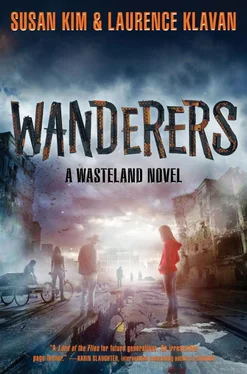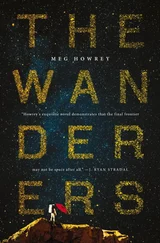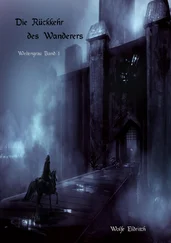“We just tried to tell you this was no place to stay,” he said.
Relief rippled over the faces of the crowd. A few whispered, “Yes.”
“But if we leave Prin, you got to listen,” he added. “And everybody’s got to pitch in. All right?”
Meekly, they nodded again.
“There’s a town nearby that might have supplies,” Caleb continued. “Schroon Lake. It’s just a few days away and I know I can get us there.”
Standing in the back of the group, Rafe was watching. He too had been injured but not by the quake itself; he had fallen downstairs in the dark, bruising his hip and twisting his ankle. While his wounds were minor, he exaggerated them by leaning on a makeshift cane.
“Excuse me?” he said. “Excuse me, but…”
He paused until he had everyone’s attention. He knew something the others didn’t. And if he played it correctly, it would be his trump card.
Back when he used to visit the Source, Rafe would be kept waiting for hours by Levi’s guards. It was, in retrospect, an insult, but at the time, Rafe had chosen not to see it that way. Instead, he had used the time to listen in on the guards’ gossip. Mostly, they traded stories of far-off places and strange sights they had seen on their travels to procure goods. One tale in particular had caught his attention; and now, he thought, was a good time to share it.
“I can take us somewhere better than that,” he said. “Someplace where you don’t got to scrape by, on account there’s food and water and for everyone. It’s called Mundreel.”
A few leaned in to hear better. Even Esther and Caleb didn’t interrupt; they, too, were curious to hear what Rafe knew, or thought he knew.
“What do you mean?” someone asked.
“Where is it?” asked another.
“I got directions,” Rafe said. “It’s a clear route. We leave now, we can be there in a week.”
This wasn’t exactly true. What the boy had were a few crude notes he had scribbled hours after he had eavesdropped on the guards, a handful of mostly illegible words and pictures. “Mundreel is bigger than a regular town. In fact, it’s bigger than ten Prins set end on end. There’s room enough for everyone.” He had left the best for last. “And I hear people there live a long time, way past eighteen or nineteen.”
As Rafe had hoped, the desperate survivors were warming to the idea. A few whispered to another, and a ripple of excitement passed through the group.
But Joseph spoke up once more. “I’m not sure that’s true.”
“What?” Rafe said. He was smiling unpleasantly.
“Mundreel may be real,” Joseph continued, his voice earnest. “Or at least, used to be; I’ve seen it on my maps. But we don’t know if it still exists… or even if it does, that it’s any better off than here. Everything you’re saying sounds like an old wives’ tale.” He paused, then added as explanation, “That means it’s made-up.”
Rafe looked with distaste at the boy who was challenging him—the man , if it were really true how old Joseph was. To him, Joseph was the town nut, even if he had read the most books. Who knew? Perhaps it was all that reading that had softened his mind in the first place. Still, he worried that the others might take him seriously.
“Well,” Rafe said, “you admit the place exists. That’s all that matters.” Then he turned his back on Joseph, to end the discussion. But someone else spoke up.
“I’ve heard the same stories about Mundreel,” Caleb said. “But never from anyone who actually been there. Or come back.”
By now, Rafe’s face was flushed with annoyance.
“So you’re saying we should go just anywhere,” he retorted. “I’m saying we go somewhere good.” He turned to the others. “Because believe me, once you see Mundreel, you won’t want to leave.” He let this sink in. “I leave it up to you. You can listen to me. Or you can trust this one.” He jerked a thumb once, at Joseph. Then Rafe pressed on his handmade cane and winced. “Let’s take a vote.”
From a quick show of hands, Mundreel was the clear favorite. And since he knew the most about their destination, Rafe was asked to be their leader.
Rafe suppressed a smile. He had once yearned to serve a powerful leader in Prin. In a place as fabulous as Mundreel, he might even become the powerful leader.
The first thing, of course, was to get there.
But he would deal with that later.
FIFTY-THREE RESIDENTS OF PRIN HAD SURVIVED, FEWER THAN HALF OF those who lived there. For the dead whose bodies could be retrieved, there were hasty burials on the outskirts of town. The others had to be left where they were. Within hours, there were already more tremors that shook the earth, sending even more buildings crashing to the ground.
The first evening, people huddled together in one of the few structures that appeared intact, a bank on the main street. All night, they could hear the marble walls and ceiling creak and shift around them; and in the morning, everyone was covered in fine dust and grit that had sifted down. It was clearly too dangerous to remain in town much longer.
Yet there was work to do before they could take off. Sturdy vehicles had to be built that would still be light enough to be pulled by bicycle. Caleb volunteered for the job. He had a knack for making things, having once created a weapon that could fire multiple rocks in rapid succession. Now he wanted to use his talent for something positive: to get everyone away from Prin.
After he told the others what he needed, the townspeople spread throughout town and collected cloth, wire, and wood; nuts and screws and buckles; and tools like hammers and saws. Caleb also ordered that all intact bicycles be rounded up and others stripped for parts.
He put the townspeople to work constructing wagons, tall and wide enough to support four children, if necessary. They then attached a wheel on either side, threaded on a metal axle that could pivot and change direction. The carts were hooked to the backs of the bicycles with chains and aluminum shafts that provided both strength and flexibility.
Meanwhile, Caleb and Esther worked on a larger vehicle, one big enough to carry enough clean water for everyone. First, they hammered scrap lumber and two-by-fours into a sturdy base. Then, as Esther built the four sides as directed, Caleb created a crude chassis. Finally, he hooked two bicycles up front, which would provide enough power to pull the heavy load.
Within three days, Caleb and the people of Prin had created a bicycle caravan, all made from whatever they had managed to salvage. Although she was exhausted, Esther could not help looking at the vehicles with a mixture of awe and pride.
“They’re beautiful,” was all she could say.
“You helped,” Caleb said; and Esther had to admit she had, though not as much as he pretended.
A sound now drew her attention. Asha had begged to take care of Kai while the construction went on, and Esther had been happy to oblige. But despite her good intentions, the girl with the child’s mind was having trouble with the rambunctious boy, who was attempting to escape from her arms.
“I can take him,” Esther said. With reluctance, Asha handed Kai back.
Kai laughed and clapped when Esther placed him in a child’s seat Caleb had attached to the back of his bike, one with a tiny canopy of its own.
“He looks ready to go,” Caleb said.
“Are you?” she said, taking his arm. Her tone was light, but her eyes were serious.
Caleb hesitated. All week, he had taken pains to remain positive, never once expressing anything but optimism and assurance. Now, talking in private to the one person he trusted, he looked uncertain for the first time.
Читать дальше












